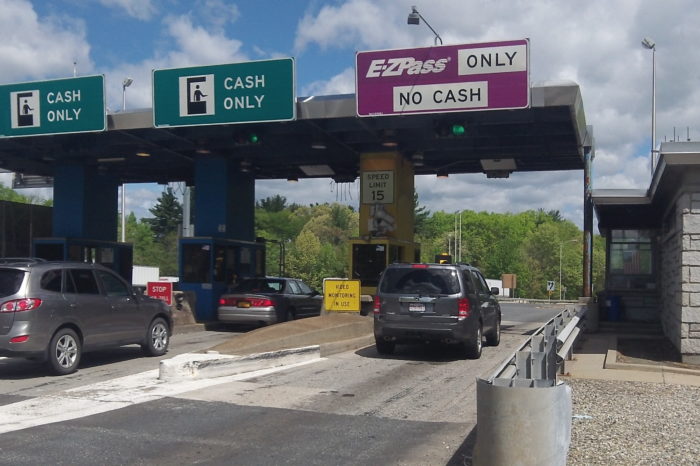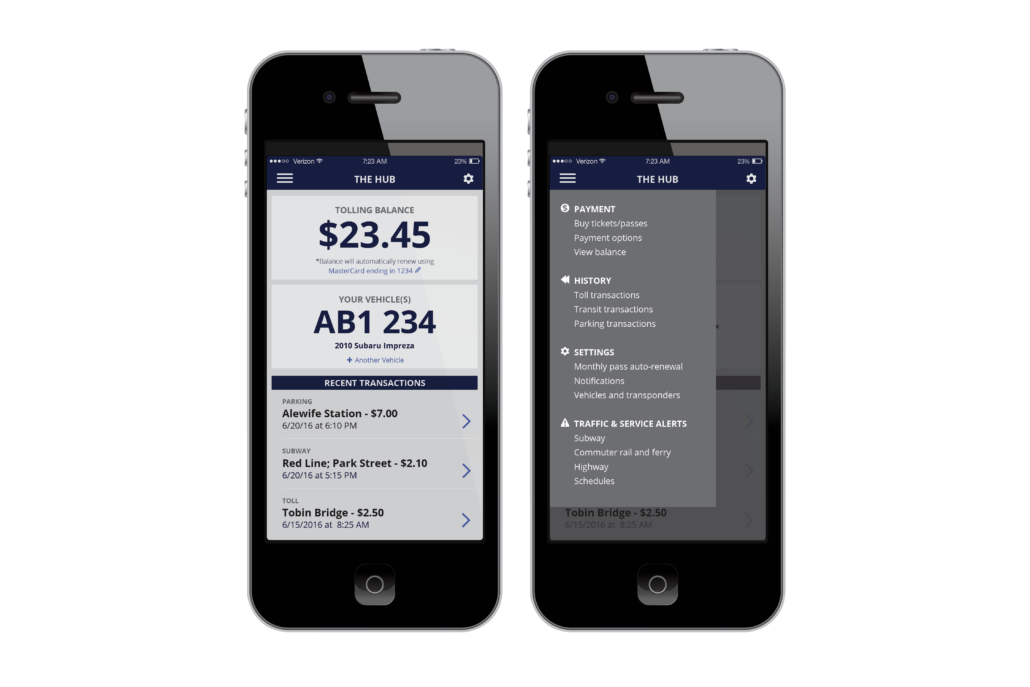Study: Expand Use of Transponder Technology to Parking, Other Non-Tolling Services
Report calls for creation of single account to simplify customer experience, boosting transponder market share, streamlining MassDOT services
BOSTON – With all-electronic tolling and the elimination of Turnpike toll booths set to take effect later this year, a new Pioneer Institute white paper calls on state leaders to embrace transponder technology for a wider variety of applications such as parking and retail services.
Driving Innovation: Tolling and Transponders in Massachusetts, by Pioneer researchers Wendy Murphy and Scott Haller, explores transponder use in other states and encourages cooperation between public agencies and private industry to simplify and rethink customers’ transportation experience.
“Whether it’s dealing with a parking lot ticket machine or sitting in line at a drive-thru window, Massachusetts commuters face a number of unnecessary hurdles,” said Pioneer Executive Director Jim Stergios. “Transponder technology has the capacity to consolidate these different services and extend their use, to make life easier for millions of people.”
E-ZPass transponders use a sensor array to automatically deduct the toll charge from a driver’s pre-paid account as s/he travels under an overhead gantry. As of November 2015, transponders were used for payment in 78 percent of Western Turnpike transactions, 81 percent of Boston extension tolls, and 74 percent of bridge and tunnel charges.
The new all-electronic tolling system (AETS) allows drivers to pay tolls without slowing down. Those without transponders are billed through a pay-by-plate system that matches license plates with Registry of Motor Vehicles records. By this fall the entire Massachusetts Turnpike is scheduled to become a cashless toll road.
Massachusetts’ shift to an AETS has been praised for its potential cost savings, increased efficiency, and accident and pollution reduction.
After the AETS program is implemented, the state plans to adopt the E-ZPass Plus program, which directly links the transponder to a credit card or bank account. E-ZPass Plus allows enrollees to use their transponder for non-toll payments, such as parking or potentially at retail locations such as a carwash or fast-food establishment. Except for two parking facilities, transponders are currently used in Massachusetts solely for tolling.
[ytp_video source=”7yezybxgKmM”]
Murphy and Haller point to parking as the most obvious starting point for Massachusetts to expand its transponder utilization, since electronic payment is already required at many Boston-area parking facilities and over 80 unattended MBTA lots. Logan Airport parking sites also offer electronic payment options.
Users currently have a separate account for each parking program, in addition to their E-ZPass account. Multiple MBTA ticket purchasing options also require separate accounts, depending on the route and type of pass.
“The compartmentalized nature of our many different payment systems creates a needlessly complex web of accounts and programs for the rider to navigate on their daily commute,” said Wendy Murphy. “The transportation system, both highway and rail, should operate in conjunction with one another, not in conflict.”
The report offers several recommendations:
- The Tolling Department should expand the use of transponders at some MBTA and Massport parking lots and garages (currently offered only at the Route 128 station and Boston Common Garage).
- The Massachusetts Department of Transportation should hire a chief technology officer for consumers to oversee transponder administration and work with other agencies and private businesses to expand its application beyond tolling.
- Massachusetts should develop a web portal and mobile app that consolidates E-ZPass transponder, electronic parking, and MBTA ticketing accounts.
- The state should allow drivers to use the transponder to engage in commerce ranging from fast-food restaurants to pharmacies and gas stations.
Florida’s SunPass, one of the nation’s most advanced tolling systems, is used for roadway and bridge tolling, express lanes and airport parking lots. It includes a user-friendly app for account management, and can be purchased and replenished at hundreds of retail locations. Transponders have also been used for tracking vehicle registration in Bermuda and making retail purchases in New York.
Some of the obstacles to more innovative use of the existing technology stem from administration of the program. The E-ZPass Interagency Group, which operates in 16 states, works largely with tolling-specific transportation agencies, which have little incentive to explore new applications outside their scope.
As customers become more familiar with the AETS, the authors note that the E-ZPass transponder itself could be replaced with technology such as a smart phone or contactless card.
The authors contend that concerns about transponder use and privacy protection have largely been addressed by federal and state legislation that make it difficult to misuse personal travel and transaction data. Data used to calculate trip times will be deidentified.
About the Authors:
Wendy Murphy is a research associate at Pioneer Institute. She received her undergraduate degree from Babson College and has held a number of marketing, strategic planning and finance positions in the private sector. She has experience working in the non-profit area as well, focusing on healthcare and education.
Scott Haller graduated from Northeastern University in Boston where he received a degree in Political Science. Scott began working at Pioneer Institute through Northeastern’s Co-op Program and has continued as a research associate focusing on healthcare and transportation policy analysis. Prior to that, he worked at the Massachusetts Office of the Inspector General.
###
Pioneer Institute is an independent, non-partisan, privately funded research organization that seeks to improve the quality of life in Massachusetts through civic discourse and intellectually rigorous, data-driven public policy solutions based on free market principles, individual liberty and responsibility, and the ideal of effective, limited and accountable government.















